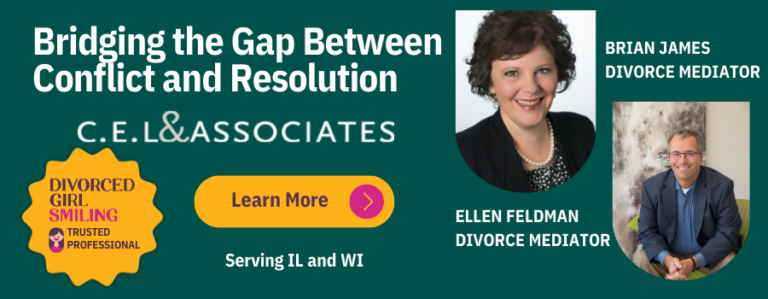My partner Brian James and I have been co-mediating for over 15 years. For the most part, we are quite successful, but occasionally we lose a couple to litigation or they decide to have their attorneys complete the divorce. If they have been successful in mediating the parenting plan (schedule for their children and holidays and decision-making), I am not disappointed if they decide to have their attorneys handle settlement of the financial piece, as the parenting agreement and their children are our top priority. In reflecting on possible disadvantages of mediation, I think many of them might further enforce why mediation is the best option.
5 Disadvantages of Mediation and why they might actually be advantages:
1. One spouse may refuse to cooperate.
If only one person is willing to mediate, do homework and produce documents, and most importantly be willing to negotiate and make agreements on the issues required to be resolved to get divorced, not only is this a disadvantage of mediation, but mediation simply will not work.
When both spouses are willing to participate in mediation with an open mind, listen to each other and make agreements, it is an amazing process. The parties advocate for themselves, state what they need, why they need it, and slowly come to agreements on each of the issues. The advantage is the mediation process might cause an otherwise uncooperative spouse to “get in the game” when they see how much more control they have in the mediation process versus litigation.
2. Mediation Depends on Full Disclosure of Information and Documents.
When you mediate, the discovery process is informal. We give our clients a list of documents to upload to a secured online folder that only the four of us can view, documents that prove the mortgage, retirement accounts, any credit card statements with balances on them, bank accounts and any other assets or debts.
Mediation depends on full disclosure by both parties of assets and debts. The financial affidavit, which each of the parties is required to fill out as part of the divorce process, is signed and dated by each person to swear that they have made full disclosure of everything in their own name. If one party is not honest in producing documents or filling out the financial affidavit, not only have they possibly committed perjury in the eyes of the court, but the mediation process will be faulty because asset disclosure is not accurate.
If there is not full disclosure of documents and information during the mediation process, then mediation will be terminated, and the clients will proceed to the costly discovery process through the courts. This includes subpoenas, depositions where you testify in front of a camera, motions to produce and multiple years’ worth of documents will need to be produced.
3. Agreements are not Binding Until They Go to Court for Prove-up.
We meet every one to two weeks with our clients and check agreements off a list until all issues are resolved. We draft a Memorandum of Understanding which outlines all of the agreements made in mediation in a easy to read and non-legalese format. Then one party hires an attorney, or they both hire attorneys, and the agreements are memorialized into the legal documents required to go to court to finalize the divorce.
At any point, one of the parties might decide they are not happy with some of the agreements and renege on the process. The mediation process is confidential, which means the agreements and conversations that have led to the agreements are not part of any subsequent court process or discoverable by the attorneys. As frustrating as that may seem, it is possible that all the effort that went into mediation is wasted if one person decides they are not comfortable with the agreements reached in mediation and want to hire an attorney to complete the process.
4. If Mediation is not Successful, the Parties may end up in Litigation.
Occasionally mediation blows up over one issue and the parties leave the process. We can usually pinpoint the rare couple that is so acrimonious that they will not be able to resolve their divorce in mediation. They care more about hurting each other than getting through the process peacefully.
However, I am the eternal optimist and would rather believe every couple can improve communication and get to the finish line of their divorce with mediation. If one issue, or several, preclude the couple from completing mediation, then they are starting from scratch on a few issues or the entire list of issues and fighting through attorneys in court.
5. One Spouse May Not Be Comfortable Advocating for Themselves.
My threshold question when a potential client calls about mediation is: “Are you comfortable advocating for yourself and telling your spouse what you want or need on any given issue?” If the answer is yes, then mediation is absolutely the best way to get through a divorce. My partner and I can always tell if someone is afraid to speak up and express their opinion on an issue. We will ask additional questions and, more often than not they become empowered and are able to explain what they want and why.
If somehow, we miss cues that someone is uncomfortable or unwilling to tell their spouse what they want, they may not be making solid agreements and the process is at a disadvantage. That said, we will not allow our clients to reach agreements that are not equitable and appropriate in their specific situation.
While there may be bumps in the road to successfully get to the finish line of a divorce with mediation, for the most part it is an amazing process which empowers, facilitates agreements, and improves communication between the parties, which enables them to better co-parent into the future. Finding the disadvantages of mediation is difficult because there are so many benefits in mediating your divorce; a process that keeps things amicable, efficient, and cost-effective.

Ellen Feldman has been working as a mediator since 2007. A graduate of Smith College and Indiana University School of Law, Feldman previously worked as an attorney for 15 years practicing commercial litigation. Since 2006, Ellen has been a volunteer for The Lilac Tree, an Evanston based nonprofit organization assisting women through the process of divorce. Additionally, Feldman completed Family and Divorce Mediation Training through DePaul University Center for Conflict Resolution and Advanced Family Mediation. She is a court-approved mediator for the 19th Judicial Circuit Family Court of Lake County. Learn more by visiting the C.E.L. & Associates website.






















I received a novel from my uncle recently and I kept seeing divorce mediation as a recurring theme for the couples around it. I never knew that proper mediation makes it easier for couples to split without legal problems. I will keep this in mind if I eventually need this someday for my marriage.